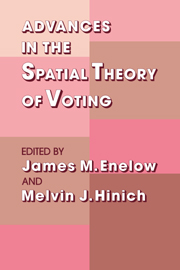Book contents
- Frontmatter
- Contents
- Foreword
- ADVANCES IN THE SPATIAL THEORY OF VOTING
- 1 Introduction
- 2 Multiparty Competition, Entry, and Entry Deterrence in Spatial Models of Elections
- 3 Heresthetic and Rhetoric in the Spatial Model
- 4 Spatial Strategies When Candidates Have Policy Preferences
- 5 A Decade of Experimental Research on Spatial Models of Elections and Committees
- 6 Candidate Uncertainty and Electoral Equilibria
- 7 The Theory of Predictive Mappings
- 8 Multicandidate Spatial Competition
- 9 The Setter Model
- Author Index
- Subject Index
6 - Candidate Uncertainty and Electoral Equilibria
Published online by Cambridge University Press: 05 March 2012
- Frontmatter
- Contents
- Foreword
- ADVANCES IN THE SPATIAL THEORY OF VOTING
- 1 Introduction
- 2 Multiparty Competition, Entry, and Entry Deterrence in Spatial Models of Elections
- 3 Heresthetic and Rhetoric in the Spatial Model
- 4 Spatial Strategies When Candidates Have Policy Preferences
- 5 A Decade of Experimental Research on Spatial Models of Elections and Committees
- 6 Candidate Uncertainty and Electoral Equilibria
- 7 The Theory of Predictive Mappings
- 8 Multicandidate Spatial Competition
- 9 The Setter Model
- Author Index
- Subject Index
Summary
Enelow and Hinich (1990) have made it clear that the spatial theory of voting encompasses a large number of alternative models of committees and elections and deals with a large number of questions about these models. This particular essay is concerned with an important topic in the spatial theory of voting that has been addressed in a number of different references in the literature: the implications (for two-candidate elections) of candidate uncertainty about whom the individual voters in the electorate will vote for. More specifically, this chapter will concentrate on what has been learned about the implications of the presence of this type of uncertainty for the existence and location of an electoral equilibrium.
Spatial voting theorists have become interested in the implications of candidate uncertainty about voters' choices primarily because there are good empirical reasons for believing that actual candidates often are uncertain about the choices that voters are going to make on election day. First, candidates tend to rely on polls for information about how voters will vote, but “information from public opinion surveys is not error-free and is best represented as statistical” (Ordeshook 1986, p. 179). Second, even when economists and political scientists have developed sophisticated statistical models of voters' choices and have used appropriate data sets to estimate them, there has consistently been a residual amount of unexplained variation (see, for instance, Fiorina 1981; Enelow and Hinich 1984a, chap. 9; Enelow, Hinich, and Mendell 1986).
- Type
- Chapter
- Information
- Advances in the Spatial Theory of Voting , pp. 145 - 166Publisher: Cambridge University PressPrint publication year: 1990
- 11
- Cited by



